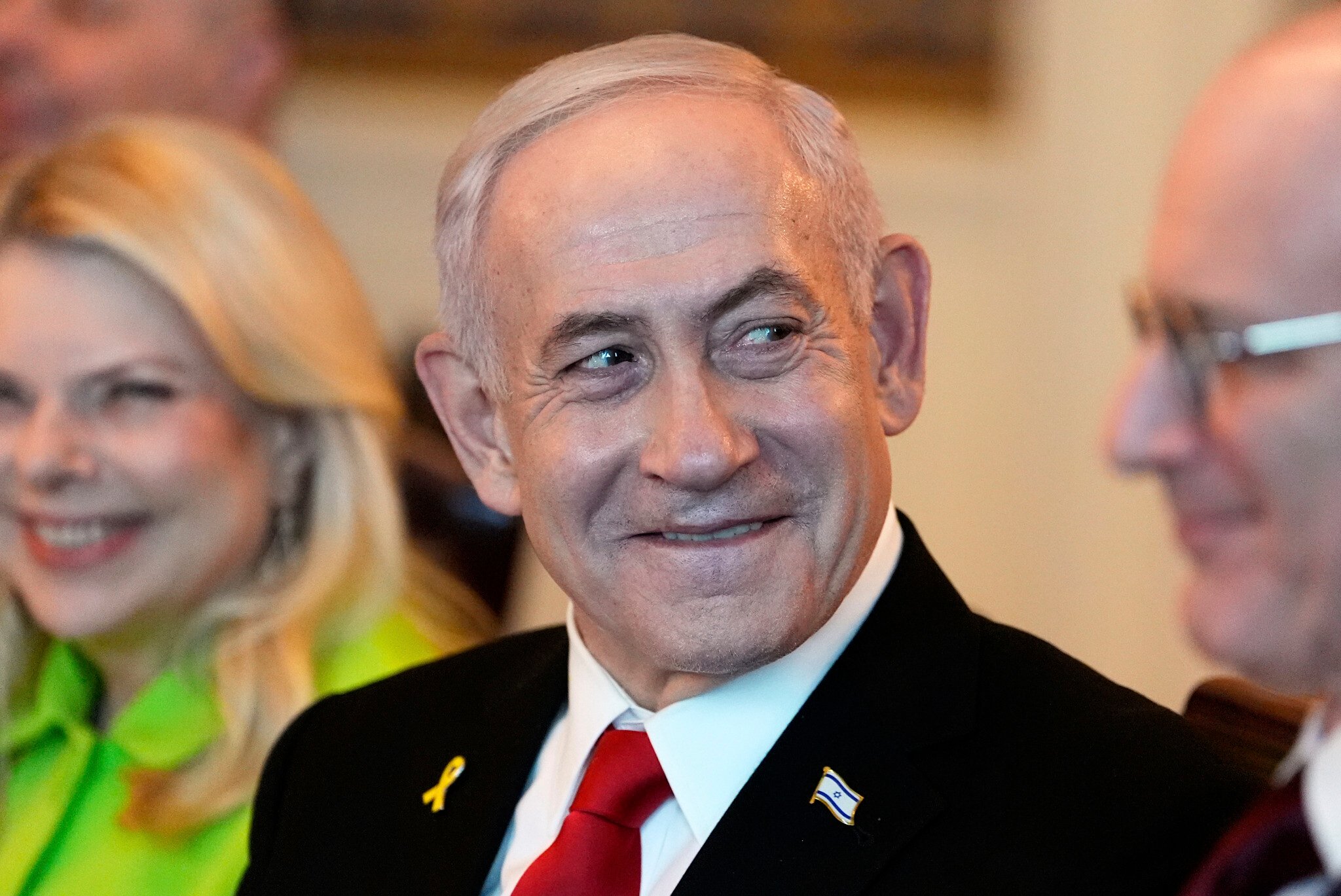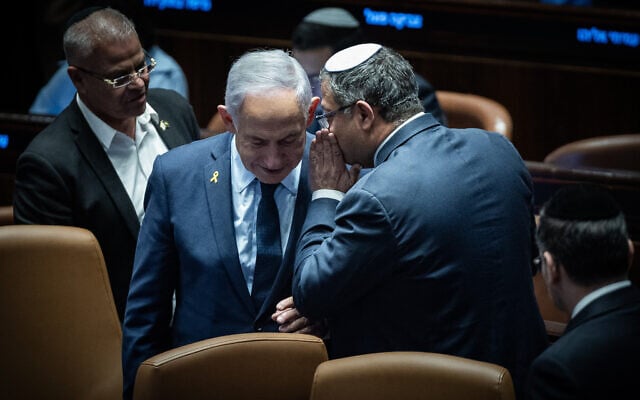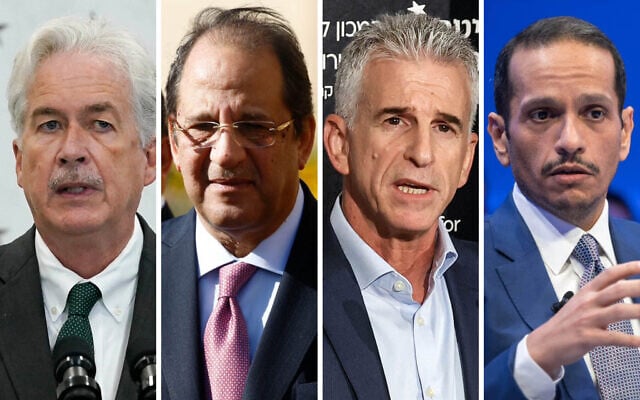



In April 2024, Prime Minister Benjamin Netanyahu shelved a Gaza truce deal that would have secured the release of at least 30 hostages due to a threat by far-right Finance Minister Bezalel Smotrich to bring down the government.
The revelation is one of many revealed Friday in according to a lengthy New York Times report on the prime minister’s political calculations that accused him of deliberately extending the Gaza war to serve his own political goals of rehabilitating his internal political image and staying in power.
While much of the report has been previously disclosed, the article also revealed how three months later, following the objection of National Security Minister Itamar Ben Gvir, Netanyahu derailed a White House effort to secure Israeli-Saudi normalization conditional on ending the Gaza war.
The report also said Netanyahu informed senior Haredi lawmaker Moshe Gafni about Israel’s plans to attack Iran three days before the June 13 opening strike, in a bid to dissuade Gafni from toppling the government over its failure to codify yeshiva students’ exemption from military service.
As has been previously reported, The Times said that in the months before the Hamas onslaught of October 7, 2023, Netanyahu repeatedly dismissed top security officials’ assessments that growing internal rifts stemming from his government’s judicial overhaul were being viewed by Israel’s adversaries as an invitation to attack.
Amid the Gaza war that was sparked by the onslaught, Netanyahu’s mistrust of security officials grew to the point that he had generals patted down before meeting with him to make sure they weren’t recording the conversations, according to the report.
The Times said Netanyahu’s office “declined several requests for interviews and did not respond to a detailed list of the findings” from the article, which was published Friday.
According to The New York Times, the Gaza truce proposal that Netanyahu scuttled in April last year would have created a window to permanently end the war and release the remaining hostages, similar to the deal currently under discussion.
Moving forward with the deal would have raised the chances for a normalization deal with Saudi Arabia, whose leadership had been secretly signaling its willingness to accelerate peace talks with Israel as long as the Gaza war ended, the report said.
But ending the war then would have risked toppling Netanyahu’s government, where Smotrich’s and Ben Gvir’s factions have sought to establish settlements in Gaza and clear the Strip of as many of its Palestinian residents as possible.
Netanyahu kept the truce plan from his government until the last minute, hoping to push it through the cabinet before his far-right coalition partners had time to organize against it.
As the cabinet convened for a meeting in April 2024, one of Netanyahu’s aides brought him a text summarizing the truce proposal for the premier to present, the report said.
But before Netanyahu could present the deal, Smotrich entered the room and declared that “if a surrender agreement like this is brought forward, you no longer have a government,” The Times said, citing minutes of the cabinet meeting.
Spooked by Smotrich’s response, Netanyahu assured the finance minister that no such plan was on the table.
The premier then quietly whispered to his security advisers, “Don’t present the plan,” and the meeting proceeded to discuss other matters.
That same month, the NYT reported, officials in the administration of then-US president Joe Biden highlighted to Netanyahu polls showing that over 50 percent of Israelis support a hostage deal over continuing the war.
“Not 50 percent of my voters,” the paper quoted Netanyahu as having replied.
The Times detailed how the Biden administration sought to advance a normalization agreement between Israel and Saudi Arabia in the spring and summer of 2024, hoping that such a prized agreement would convince Prime Minister Benjamin Netanyahu to end the war in Gaza.
Netanyahu initially appeared on board with the idea, in May, revived the truce offer that he had shelved a month earlier due to the threat from Smotrich, The Times reported. By the end of July, however, he reportedly added new demands for a truce that torpedoed the negotiations.
The renewed US effort to broker an Israel-Saudi deal began on May 18, 2024, when then-US national security adviser Jake Sullivan traveled to Dammam in eastern Saudi Arabia to meet Saudi Crown Prince Mohammed bin Salman.
Even though hostility toward Israel was peaking in the Arab world due to the war in Gaza, bin Salman arrived at his meeting with Sullivan determined to advance a series of agreements with the US that would include an Israel normalization deal.
“Let’s finish this,” The Times quoted him as having told Sullivan at the time.
The US and Saudi teams made significant progress on the bilateral security, economic and energy-related agreements with the US, with many of the outstanding issues resolved.
The main obstacle left was the buy-in from Netanyahu, whom Saudi Arabia wanted to end the war in Gaza and agree to establish a pathway to a future Palestinian state.
On May 19, Sullivan flew from Saudi Arabia to Israel to convey the message to Netanyahu. The premier initially responded positively to the US initiative, and on May 22, okayed the truce plan from the previous month.
On May 27, the Israeli proposal was sent to Egyptian and Qatari mediators, who were enthusiastic about the chances for a deal, and four days later Biden gave a speech publicizing the key details of the proposal and urging Hamas to accept it.
But the deal didn’t include a guarantee sought by Hamas that the temporary truce offered by Israel would turn permanent. The terror group dragged its feet in truce talks for over a month.
Still enticed by the prospect of a Saudi normalization deal, Netanyahu authorized Strategic Affairs Minister Ron Dermer to hold secret talks with UAE Foreign Minister Abdullah bin Zayed about the post-war management of Gaza — something he had been refusing to do for over six months due to concerns that it risked collapsing his government.
In early July, Hamas agreed to soften its position, forgoing its demand for an up-front Israeli commitment for a permanent ceasefire, thereby opening a window for an agreement.
“We may have a deal,” Netanyahu told Dermer at the time, according to The Times.
But Ben Gvir got wind of the development and rushed to try and thwart it. He tried to burst into Netanyahu’s Jerusalem office in order to speak his mind, but the premier wouldn’t allow him in. Ben Gvir was resigned to issuing a tweet condemning the “reckless deal,” adding that he was “working to ensure the prime minister has the strength not to fold.”
On July 28, a summit was held at the residence of Qatar’s ambassador to Italy to finalize the agreement. In attendance were Mossad chief David Barnea and three lead mediators: then-CIA chief Bill Burns, Qatari Prime Minister Mohammed bin Abdulrahman al-Thani and then-Egyptian intel chief Abbas Kamel.
While the other participants arrived thinking that a deal was on the verge of being reached, a “sheepish and apologetic” Barnea instead handed the mediators a copy of a letter detailing six new demands from Netanyahu that derailed the process, The Times reported.
One of the demands was that the IDF remain in the Philadelphi Corridor, which separates Gaza from Egypt.
Israel’s security establishment had maintained that continued IDF presence there was not essential and could be quickly restored if need be. However, Netanyahu made the issue into a key sticking point in the talks, arguing that control of the Corridor was necessary to thwart arms smuggling from Sinai into Gaza.
US anger at Netanyahu peaked during an August 1 phone call that Biden held with the Israeli premier.
“Stop bullshitting me,” The Times quoted Biden as having told Netanyahu.
In June, Netanyahu’s luck in keeping his government whole appeared to be running out when his ultra-Orthodox coalition partners seemed set to topple the government.
The ultra-Orthodox parties were angered that, a year after the High Court ruled that yeshiva students’ military service exemption had no legal basis, the government had yet to pass a law codifying it.
On June 9, two days before a vote on an opposition-backed bill to disperse the Knesset and call early elections, Gafni — who leads the Degel Hatorah faction of the ultra-Orthodox United Torah Judaism party — was summoned by Netanyahu for a meeting at the IDF headquarters in Tel Aviv.
At the start of the meeting, Gafni was told by Netanyahu to sign a confidentiality agreement and, upon doing so, was given the details of Israel’s planned attack on Iran’s nuclear and military targets, which would be launched four days later, on June 13.
According to The Times, Gafni left the meeting suspecting that Netanyahu may have been attempting to manipulate him into dropping the threat to dissolve the government, but also worried that if the bill passed, it could interfere with Israel’s planned operation in Iran.
Ultimately, the Degel Hatorah faction withdrew its support for the bill to dissolve the Knesset, and it failed to garner enough votes to pass.
Gafni is not the only Haredi lawmaker said to have been told about the Iran strike in advance, as days into the 12-day war last month, Shas leader Aryeh Deri appeared to confirm that he too had known about it.
Writing in HaDerech, Shas’s official newspaper, Deri said that the decision to launch the Iran operation “was the most difficult decision that any cabinet in the State of Israel has ever made.”
“Long months of discussions, hundreds of hours of security reviews, analyses and risk assessments – everything boiled down to one charged, fateful moment: whether to approve the military attack plan against Iran,” he had written.
A spokesman for United Torah Judaism chairman Yitzhak Goldknopf, who quit the government over the draft issue, said he did not receive an advance notice of Israel’s June 13 attack on Iran.
Asked by The Times of Israel if the UTJ chief had been informed as well, a spokesman for the lawmaker stated that Goldknopf “was not informed.”
The Times reported that in order to prevent the leaking of conversations that could harm him politically, Netanyahu’s aides ordered military officials to stop using a recording device traditionally operated during meetings held by generals.
Weeks after the October 7 onslaught, Netanyahu’s meetings with generals were also moved to another room with no permanent recording device, allowing the premier’s aides to be the ones to record, even while the military officials could not.
Generals, including then-IDF chief of staff Herzi Halevi, were patted down by Netanyahu’s security guards to make sure he didn’t have a hidden microphone on him.
Netanyahu’s suspicions were an extension of his belief that the security establishment was to blame for Hamas’s October 7 onslaught, and not the political echelon.
Also in the Times story, the paper reported that Smotrich during a March cabinet meeting to fire then-Shin Bet chief Ronen Bar called for the security agency to be stripped of its mandated requirement to protect Israel’s democratic institutions.
“It is time to remove the protection of democracy from the Shin Bet law. The people protect the democracy,” he said, according to minutes from the meeting obtained by the NYT.
A spokesperson for Smotrich said the minister was misquoted and was only arguing that the Shin Bet shouldn’t meddle in court cases.
The paper also reported how Justice Minister Yariv Levin — one of the chief architects of the government’s judicial overhaul — was found on a staircase crying as the October 7 onslaught unfolded.
A Levin spokesperson denied that the minister had cried that day, but two witnesses testified to the contrary, including Moti Babchick, a senior ministerial aide.
Sam Sokol contributed to this report.








